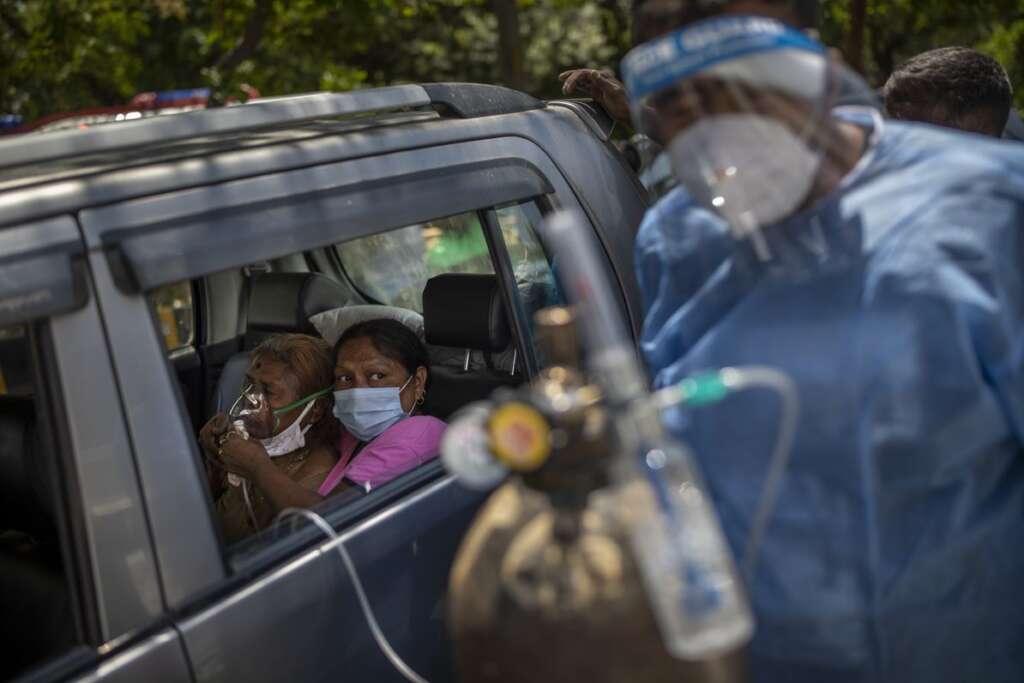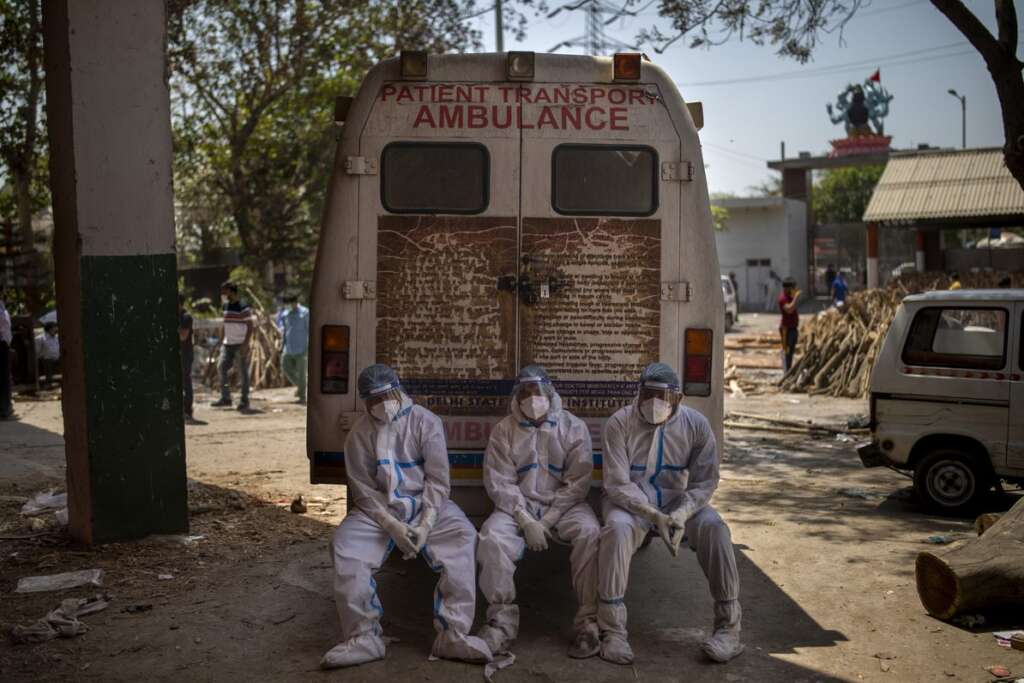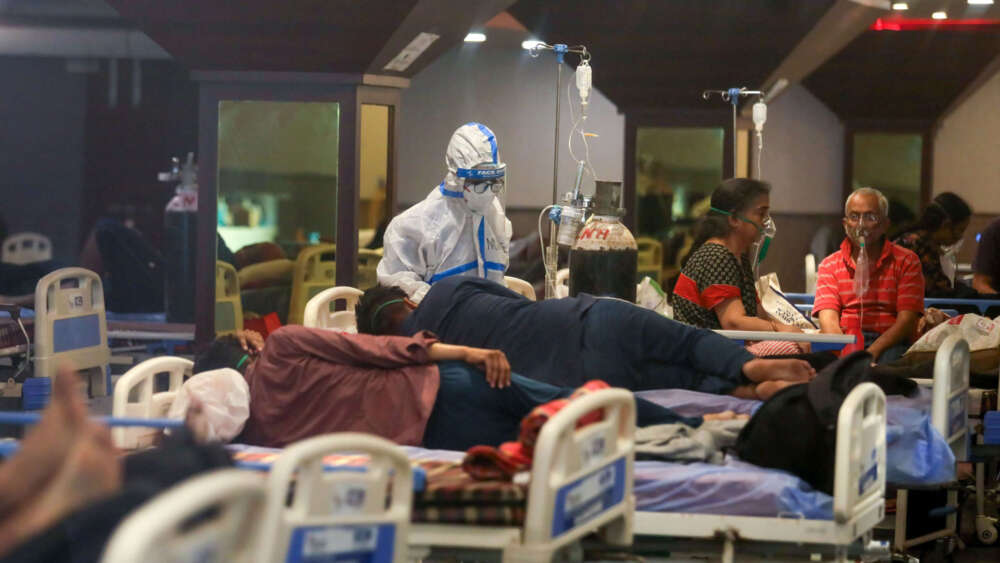Let India's great crisis move us to acts of great love
World Vision Australia’s Daniel Wordsworth on the tragedy and opportunity of India’s COVID crisis
Daniel Wordsworth is Chief Executive Officer at World Vision Australia.
The burning orange flames of open pyres have become a powerful symbol of the suffering of India in the world’s worst coronavirus crisis so far.
You will have seen the footage on television and social media, the fires and the air thick with apocalyptic smoke, men loading lifesaving cylinders of oxygen in trucks, masked crowds forming queues outside of the full hospitals where supplies are running out, hoping for help – and with them, in someone’s arms, or on a makeshift stretcher, the sick or dying human being in the centre of the chaos.
It’s easy to project yourself there.
That’s your mother on that stretcher, your child. There is a heartbreaking pathos to that vulnerable and suffering human being – whose life is literally in the hands of others – that catches your heart and leaves you breathless.
It is going to take a mammoth global effort to help the people of India get COVID-19 back under control.
You will have heard India’s fearful numbers. The official count of coronavirus cases surpassed 20 million on Tuesday, nearly doubling in the past three months, while deaths officially have passed 220,000. Staggering as those numbers are, the true figures are believed to be far higher, the undercount reflecting a health care system buckling under a frightening load.
 India is now the epicentre of this pandemic and it is also a humanitarian catastrophe of staggering proportions.
India is now the epicentre of this pandemic and it is also a humanitarian catastrophe of staggering proportions.
The situation is so dire that World Vision is launching an appeal to raise desperately needed funds for our work in India. But it is going to take a mammoth global effort to help the people of India get COVID-19 back under control and even when it is, the aftershocks will be felt for months and years to come.
It’s at moments like these that I am profoundly grateful to work for a Christian organisation that exists to serve the ideals of Australians who want to make the world a better place for children.
Human suffering is confronting. As someone who has worked in some of the world’s darkest places over the past three decades, I can say truthfully, you never get used to it.
But I can also tell you, that when you are seeking goodness and love in the world, suddenly you see it everywhere.
The goodness is in that conscious moment of empathy.
It’s not only when we see the one we love on the stretcher, hoping against hope that his or her life will be saved – it’s when we can imagine the one we love on the stretcher – that’s where we find our deepest love.
That’s when we stand shoulder to shoulder with our fellow human beings and find ways to give. As Paul says in Galatians 6:2, when we carry each other’s burdens, we fulfill the law of Christ.
Plague and pestilence – or as we would say now, pandemics – have always been with us. But humanity has not always treated them the same way.
Some have argued that one reason Christianity grew while Roman paganism waned from the first to the fourth centuries was because of the mercy Christians displayed toward people who physically suffered, especially during two plagues that ravaged the Roman Empire.
In the greatest crisis comes the greatest possibilities for love in action.
Dionysius, Bishop of Alexandria, recounted how the Christians showed mercy to others during the pandemic:
“Most of our brethren showed love and loyalty in not sparing themselves while helping one another, tending to the sick with no thought of danger and gladly departing this life with them after becoming infected with their disease. Many who nursed others to health died themselves. The best of our own brothers lost their lives in this way – some presbyters, deacons, and laymen – a form of death based on strong faith and piety that seems in every way to equal martyrdom. They would also take up the bodies of the saints, close their eyes, shut their mouths, and carry them on their shoulders. They would embrace them, wash and dress them in burial cloths, and soon receive the same services themselves.”
It’s possible to argue that the secular humanitarian response to suffering has its roots in a Christian imagination.
Right now, our global community is convulsed with uncertainty – and at this moment, in India is the fiercest expression of that.
 But already we can see the goodness. In the greatest crisis comes the greatest possibilities for love in action.
But already we can see the goodness. In the greatest crisis comes the greatest possibilities for love in action.
The international community is donating respirators, concentrators, medicines, vaccines, oxygen and funds.
At World Vision, with the help of our generous donors, we are redoubling efforts to support hospitals, health centres, and communities with personal protective equipment, surgical masks, sanitiser, and continued support for vulnerable families with cash and voucher assistance to ensure they can access food during shutdowns.
There are staff working round the clock to get the job done. In the field, there will be families looking after each other’s children. Supporters are donating money.
There is always a way.
It’s in giving that we find true joy and become our best selves.
Email This Story
Why not send this to a friend?


